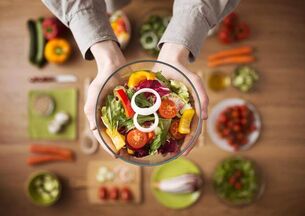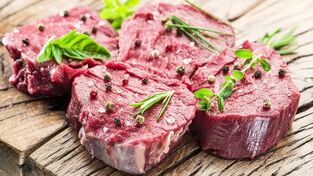Japanese movies and animations are famous for their authentic atmosphere, wonderful images, incredibly beautiful and slim Japanese women. The Japanese are recognized as the slimmest people in the world. The secret lies not only in the thin national characteristics, but also in diet and healthy eating. The name "Japanese Food" alone is interesting. What does it take to become a fragile art? Let us figure it out!
The reason for the so-called Japanese diet may not be clear, but the results of this method are impressive-you can lose 4-8 kg in two weeks, depending on your initial weight. A source said that this method was developed in a clinic in Tokyo, and the other is-the transparency of rules and dietary patterns points to a clear path to this goal. Those who try will be rewarded-a way reminiscent of a samurai.
Japan’s 14-day diet (original version) is widely known around the world, and its product list is moderately priced and affordable. Japanese nutritionist Naomi Moriyama claims that low-carbohydrate foods and moderate amounts of food help maintain youth and longevity.

According to Moriyama's research statistics, Japanese people consume 25% less calories than other countries. The use of fatty foods, fatty foods and butter on an industrial scale is not popular in the country. Healthy food and small amounts of food are the hallmarks of Japanese culture.
Although the dietary composition of the residents of Risheng Land is different, the principle corresponds to the Japanese diet for 7 days or 2 weeks.
In this article, we will analyze:
- The
- principle stipulated by the Japanese Weight Loss Law;
- The pros and cons of this method;
- People who are not suitable for Japanese weight loss diet for health reasons;
- Basic menu 7 days and 14 days;
- Whether to stick to it.
Japanese food samurai rules
In order for the 7, 13, and 14-day Japanese diet to take effect, you must abide by the following rules:
- Preliminary preparation-a week before the start, give up fast food, fatty products, sweets, and salty food;
- Completely eliminate salt, sugar, spices, and sauces in the diet;
- Chew the food thoroughly to make it saturated;
- Strictly abide by the pre-compiled menu of Japanese diet during the selected time period (7, 13, 14 days);
- It is forbidden to change the sequence before the meal day;
- Woke up and drank a glass of warm water;
- Coffee can be replaced with green tea;
- Observe drinking water regulations-at least 2 liters of still water. The decay products of animal protein are excreted and filled the stomach, reducing hunger;
- It is prohibited to replace ingredients or add unauthorized products;
- Application frequency of the method-2-3 times a year. The reason is that the body is under a lot of pressure.
- The exit of the diet should be smooth, so as not to lose the fat to return;
- The Japanese diet for weight loss uses protein food as the main source. Small amounts of biscuits and fibrous carbohydrates, as well as fat from unrefined oils, are used as a seasoning for salads, meat and fish.

The strict Japanese diet contains all the macronutrients in the diet, despite warnings. In this respect, the method cannot be said to be balanced. Therefore, in order not to harm health, Japanese eating habits should be taken within 7 to 14 days.
Even within two weeks, a protein diet will reduce vitality, causing apathy and headaches due to low carbohydrate content in the diet. At the first signs of serious illness, it is recommended to use complex carbohydrates or to refuse diet altogether.
Strict Japanese weight loss diet characteristics
The first association with the name "Japanese Food"-within 14 days, the menu has become a daily sushi, rice and curry for breakfast, lunch and dinner, but the quantity is limited. In fact, this method has the following characteristics:
- small part;
- Calorie intake-800 kcal;
- Three meals a day, no snacks;
- 14 days-maximum period;
- Salt exclusion.
The essence of dietary nutrition

The basic rule is that Japan’s 13-day diet restricts the intake of sugar, salt and carbohydrates. Within 7. 13 or 14 days, you can lose up to 8 kg of excess weight. Lack of trace elements and trace elements may seriously damage the work of the human body, so it is very undesirable to insist on using this method for a long time.
Japan has a salt-free diet for 13 days, because Orientals think this number is very lucky. However, in Europe, people have different views on numbers, so the weight loss lasted 7 or 14 days due to suspicious and convenient.
Contraindications
Japanese diet is considered strict for one or two weeks, and there are many contraindications:
- Used for high blood pressure, heart disease, blood vessels;
- Diabetes;
- Thyroid disease;
- During pregnancy and breastfeeding;
- Any complicated gastrointestinal disease, kidney disease;
- When participating in sports;
- Hard physical and mental work.
If you have a problem of quickly getting rid of kilograms during meals, it is recommended to give priority to fasting-this approach will not harm your health, reduce digestion, and get rid of stagnant water during celebrations.
Advantages
Japan's 7-day and 14-day salt-free diet is gradually becoming popular. What attracted this method:
- The effect of weekly weight loss;
- Remove water from the body;
- Easy to eat and affordable ingredients.
The early results of the Japanese diet are impressive. The greatest weight loss at this time is caused by the removal of "ballast" from the water due to the minimal consumption of salt and carbohydrates. In the second week, the weight does not disappear so actively because there is no excess water. Food has almost no energy, so the body is forced to break down its own fat.
However, fat destroys muscle tissue. If long-term maintenance, in addition to worsening the health condition, the quality of the body will also deteriorate. It is worth considering whether it is worth it.
Disadvantages

The low-carb, salt-free Japanese diet will not disappear without consequences. Disadvantages of this method:
- Insufficient calories (800 kcal) will slow down the metabolism;
- Deterioration of chronic disease;
- The restriction on the micro and macro elements destroys all the functions of the body;
- High pressure on the functional system;
- Coffee replaces breakfast, which is the work of the heart and blood vessels.
- The menu is thin and limited, which brings psychological pressure to people, which is full of various malfunctions;
- System hunger reduces concentration;
- High fatigue, irritability, apathy, decreased performance, dizziness;
- Resuming the daily diet quickly can reduce the kilograms of weight loss.
Recommended and prohibited products
No matter how romantic the name of the weight loss method sounds, it will not be exotic. The food contained in the Japanese salt-free diet is familiar to Europeans. The ingredients are available in supermarkets or grocery stores at reasonable prices.
Meat and fish dishes with vegetables as side dishes are common. But excluding salt and spices, bread, grains and pasta becomes a psychological test.
Allow menu editing food list:

- Protein-sea fish, beef, veal, chicken fillet, eggs, low-fat hard cheese;
- Beverages-water, natural coffee, green tea, homemade tomato juice without salt, 0. 1-1% kefir;
- Black bread croutons;
- Fiber (vegetables)-carrots, cabbage, zucchini, eggplant, parsnip root;
- Fat-unrefined oil (olive oil, vegetable oil);
- Fruits-green apples and pears, citrus fruits.
Food ingredients not listed are still banned.
Menu 7 days
In the 14-day Japanese diet menu (a limited set of foods), specific nutrition tables will help you to verify clearly.
Days/Meals |
Breakfast |
Lunch |
Dinner |
Monday |
Coffee |
2 eggs, a cup of tomato juice, butter cabbage salad |
200 grams of sea fish |
Tuesday |
Coffee, brown bread croutons |
200g fish, creamy cabbage salad |
100 grams of beef, a cup of kefir |
Wednesday |
Coffee |
1 egg, salad, plus 3 cooked large carrots with butter |
2 apples |
Thursday |
Coffee |
Zucchini or parsnip root, 1-2 apples |
100 grams beef, cabbage salad, 2 eggs |
Friday |
1 cooked or raw carrot with lemon juice |
500 grams of sea fish, a glass of tomato juice |
2 apples |
Saturday |
Coffee |
500g chicken breast, carrot and cabbage salad (or an ingredient) |
2 eggs, butter carrots |
Sunday |
Coffee |
100 grams beef, 2 apples or pears |
Any changes in the previous few days, except Apple |
Cooking methods: steaming, boiling, roasting. Exclude barbecue.
14 Days of Japanese Diet: A Brief Introduction

If there is no malfunction in the first week given, and your health allows you to continue, then in the second week, the menu from the previous seven days will be repeated, or the menu will be more diverse.
Menu 14 days
It is forbidden to reschedule meals or dates.
1 day |
Breakfast: Coffee/cup of green tea without milk and sugar Lunch: stewed cabbage with a little olive oil, tomato juice, 2 hard boiled eggs Dinner: 200 grams of boiled fish |
Day 2 |
Breakfast: A small piece of rye bread, coffee or green tea Lunch: 200 grams of boiled fish, creamy cabbage salad Dinner: 100 grams of boiled beef, 1 cup of kefir, 0. 1-1% |
Day 3 |
Breakfast: A small piece of rye bread, coffee or green tea Lunch: Zucchini or eggplant is fried in vegetable oil (unlimited amount) Dinner: 200 grams of boiled beef, cabbage with a little oil, 2 boiled eggs |
Day 4 |
Breakfast: Carrot juice and lemon juice Lunch: 200 grams of boiled fish, a glass of tomato juice Dinner: 200 grams of apples |
Day 5 |
Breakfast: Carrot juice and lemon juice Lunch:200 grams of boiled fish, a glass of tomato juice Dinner:200g grapefruit |
6 days |
Breakfast:coffee or green tea Lunch:Boiled chicken fillet, cabbage and carrot salad with vegetable oil Dinner:2 boiled eggs, fresh baby carrots |
7 days |
Breakfast:coffee or green tea Lunch:200g boiled beef Dinner:200 grams of pears or 200 grams of boiled fish / b2 boiled eggs with a small amount of fresh carrots / 200 grams of boiled beef and 1 cup of low-fat kefir |
Day 8 |
Breakfast:coffee or green tea Lunch:Boiled chicken fillet, fresh cabbage salad and carrots with vegetable oil Dinner2 boiled eggs, baby carrots |
Day 9 |
Breakfast: Carrot juice and lemon juice Lunch: 200 grams of boiled fish, a glass of tomato juice Dinner:200g apples |
Day 10 |
Breakfast:coffee or green tea Lunch:1 boiled egg, 3 small carrots, 50 grams cheese Dinner:200 grams of oranges |
Day 11 |
Breakfast: a small piece of rye bread, coffee or green tea Lunch:Zucchini or eggplant is fried in vegetable oil Dinner:200 grams boiled beef, 2 boiled eggs, fresh cabbage salad with vegetable oil |
Day 12 |
Breakfast: a small piece of rye toast, coffee or green tea Lunch:200 grams of boiled fish, fresh cabbage salad oil Dinner: 100 grams of boiled beef, 1 cup of kefir 0. 1-1% |
Day 13 |
Breakfast:coffee or green tea Lunch:2 poached eggs, cabbage with vegetable oil, a glass of tomato juice Dinner:200 grams of fish boiled or fried in vegetable oil |
Day 14 |
Breakfast:coffee or green tea Lunch:200 grams of cooked or fried fish, salad with fresh cabbage oil Dinner: 100 grams of boiled beef, 1 cup of kefir 0. 1-1% |
14-day Japanese food shopping list
For convenience, the following is a shopping basket list of meals for two weeks:

- Coffee (ground or coffee beans)-1 pack;
- Green tea (without fragrances, additives)-1 pack;
- Eggs-2 dozen;
- Sea fish fillets-2 kg;
- Lean beef-1 kg;
- Chicken fillet-1 kg;
- Unrefined vegetable oil-500ml;
- Chinese cabbage-2 forks;
- Carrots-3 kg;
- Zucchini, eggplant-1 kg;
- Apples, pears, oranges-2 kg;
- Tomato juice-1 liter;
- Kefir 0. 1-1%-1 liter;
- Lemon-2;
- -1 loaf of rye bread (dry in the oven).
Japanese food for a month
Due to monotonous diet and low-calorie, no practice for more than 14 days. At least in their correct thinking.
Preparation phase and exit
The duration of the preparation phase is one week. The use of salt is minimized, excluding sugar, flour, pickles, canned food, fruits and berries, and dairy products.
The day before starting, one product is fasted for one day-this will allow the body to adapt to small amounts of food and calories. Warm water will help you relieve hunger, and chewing thoroughly will make you feel full.
If you suddenly return to your usual diet, it will arouse your body’s stressful state, overload your digestive tract and lose weight. Therefore, the withdrawal of the Japanese diet is based on the principle of proper nutrition. Indicative menu:

- Breakfast: liquid oatmeal made from sugar-free coffee with a spoonful of honey in water;
- Snacks: a handful of dried fruits and nuts.
- Lunch: boiled beef with brown rice, fresh vegetables;
- Afternoon snack: low-fat berry cheese;
- Dinner: Vegetable salad with sour cream, grilled fish.
The menu needs to be kept for a few days, and the serving size is increased to the required daily calorie intake every day.
Why shouldn't you choose Japanese food
The Japanese diet cannot develop healthy eating habits due to its short duration, which can lead to diet collapse. Lack of healthy eating rules can lead to malnutrition. If you quit the Japanese diet without following the previous menu, the kilograms lost will increase, thus wasting time and health.
The best solution is to choose a technique that can teach you how to eat correctly and become a way of life. It can be a paleo diet, or it can be the result of a lack of basic daily calorie intake and an increase in the amount of protein food.
The weight loss format is everyone’s personal choice. But before doing so, we must not only consider the reality and attainability of the set goals, but also evaluate the possibilities and weigh all the pros and cons. Don't forget that health is the source of life.
Learn more about Japanese food
To understand the basic rules of this diet, you need to understand the Japanese themselves. How much do we know about their country? They are characterized by a solid and casual approach to any business. Food is no exception. The Japanese diet has no clear boundaries. It can last from 13 days to 13 weeks.
Some people may find this diet boring and hungry. In fact, her menu is very satisfying and varied. As we said, it must be aged for at least 13 days. Most importantly, as in any diet food, there is a smooth transition from regular food to daily diet and vice versa.
The basic principle of Japanese diet is to accelerate and optimize the body's metabolism. All ingredients in the diet have been carefully selected, even if you think that the substitutes are equal, do not apply another substitute. In addition, we do not recommend changing the order of dates.
Have a light dinner on the eve of eating. During eating, you can eat with chopsticks. Immerse yourself in the atmosphere of the Far East, and eating will not be as annoying and boring as other foods!
Food menu
The Japanese diet is based on strict control of protein intake and limited intake of carbohydrates and fats. The menu includes fish, meat, eggs, fruit juice, vegetables, and boiled water and mineral water
Like any diet, the Japanese diet has its drawbacks. It is not rich in trace elements and vitamins, and black coffee can be used. Therefore, if you are not suitable to use black coffee, please see a doctor. Maybe he will use black tea or green tea instead. You cannot use salt, sugar, flour, alcohol.
Conclusion
You may have noticed that Japanese people are generally healthy people and are known for longevity. Have you encountered an overweight person in Japan? Rarely. In Japan, compared with other parts of the world, people usually eat less low-calorie foods. People in our area can also try to lose weight through the Japanese diet, which is considered very effective and very popular.
Comments
Opinions on Japanese food vary. Some people say this is a truly effective diet with amazing results, while others accuse it of being too harsh. The doctor’s negative comments are based on the fact that the Japanese diet puts a heavy burden on the kidneys due to the large consumption of protein.
In any case, in the process of moving towards the perfect body, please pay attention to any popular eating habits. Before you start to lose weight and change your eating habits, be sure to consult an expert, because your main goal is to be the best, not to go to the hospital.






























